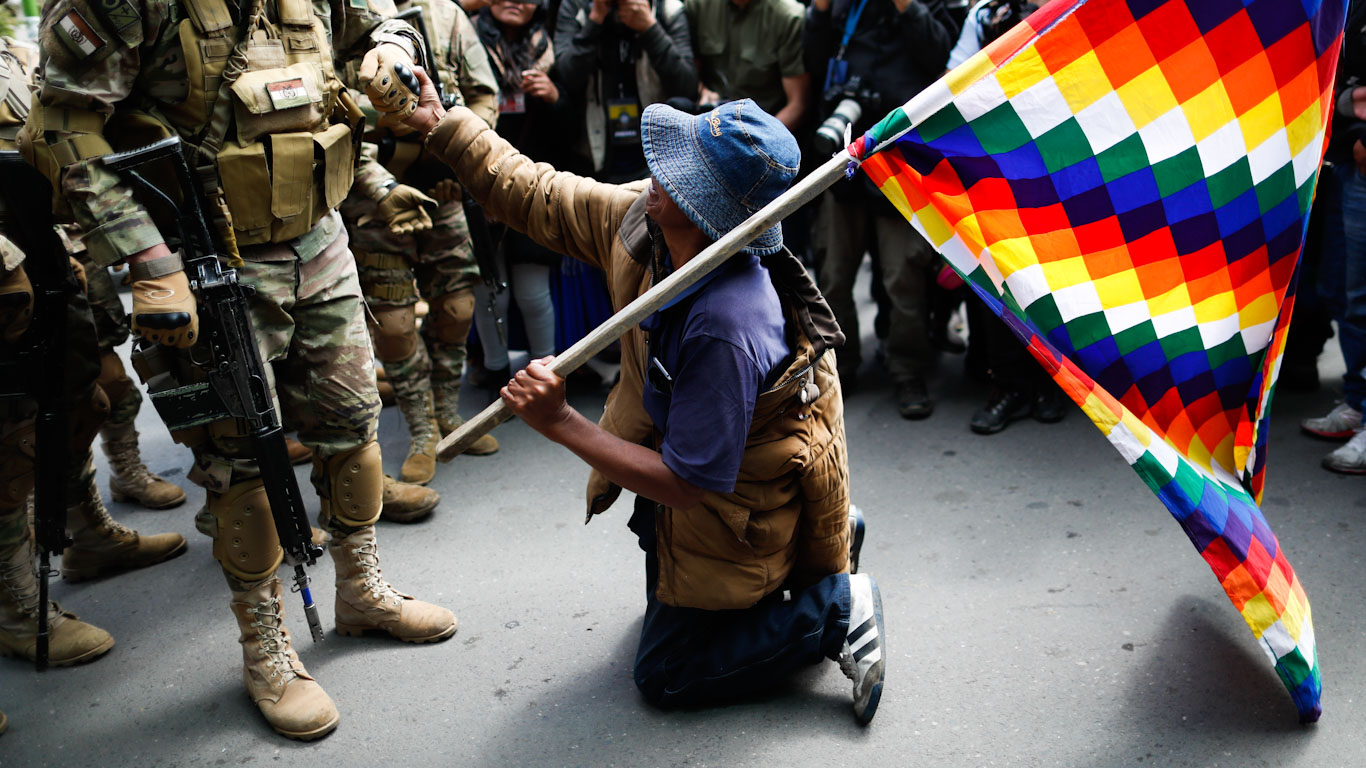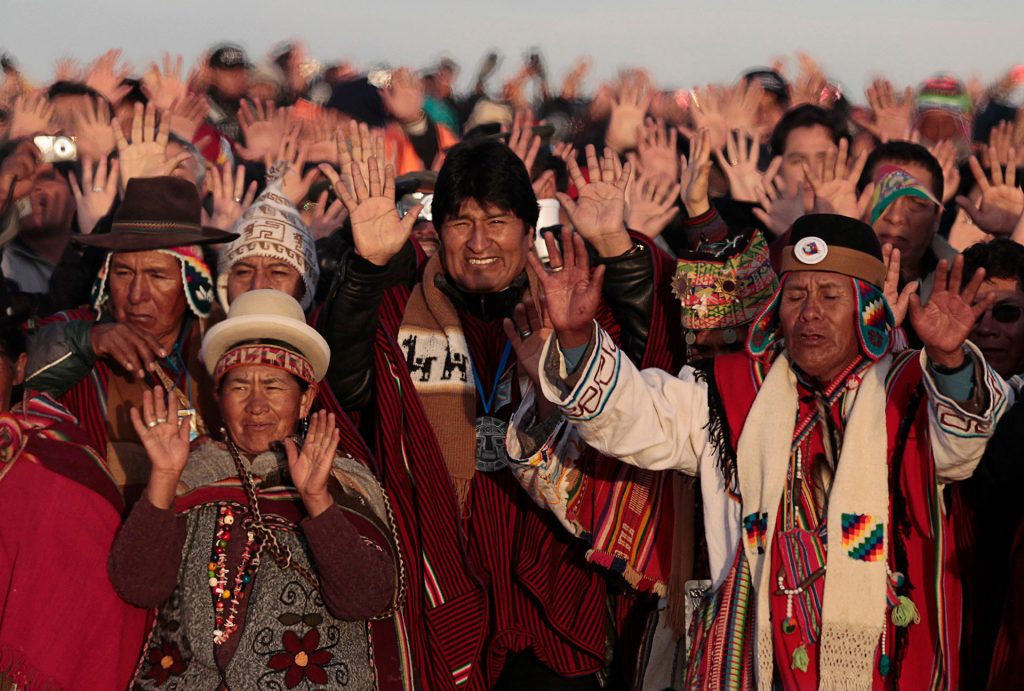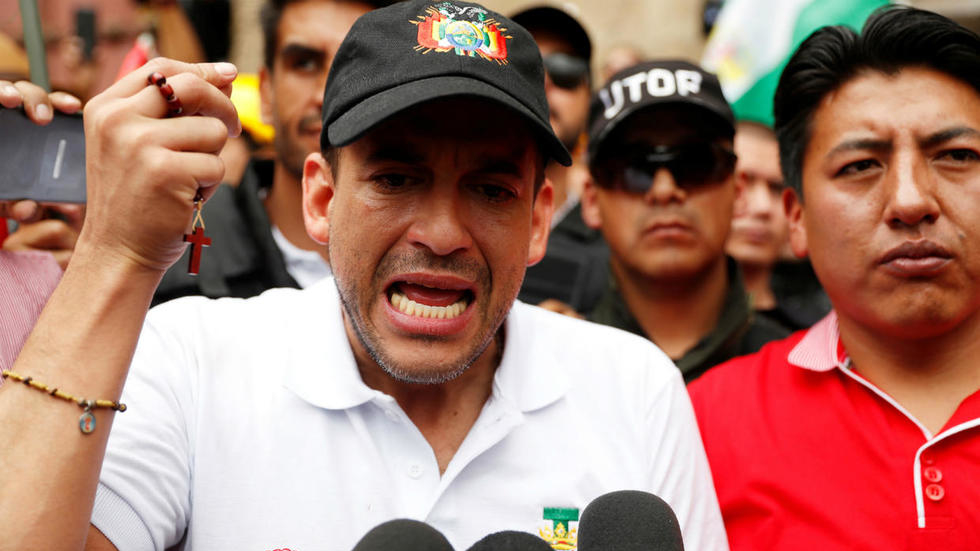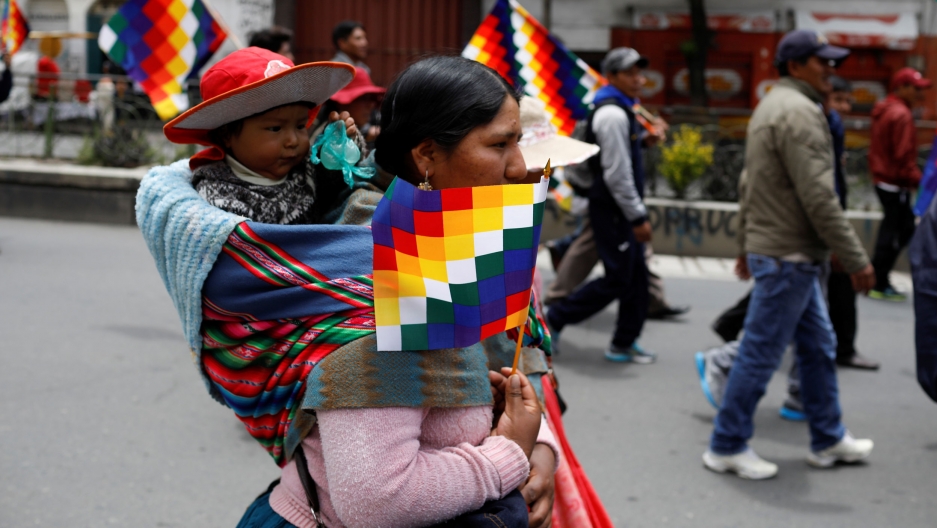RIO DE JANEIRO, BRAZIL – After the ousting of Evo Morales, hatred penetrates the neighborhoods of Bolivia’s traditional urban, white, middle classes like a dense nightly fog. Their eyes are filled with anger. They do not shout, they spit; they do not request, they compel.
Their songs are not about hope or brotherhood, but about contempt and discrimination against the Indians. They ride their motorcycles, they get on their pickups, they gather in their fraternities and private universities and go on a hunt for Indians who have dared to snatch power from them.

In the case of Santa Cruz, they organize motorized hordes with clubs in their hands to teach Indians a lesson they call “Kollas” and live in the poorer neighborhoods and markets. They chant slogans like “you have to kill Kollas” and when they meet a woman in a long skirt on the way, they beat her, threaten her and ask her to leave their territory.
In Cochabamba, they organize groups to demonstrate their racial supremacy in the southern part of the city where the poorest people live. They attack thousands of defenseless peasant women demonstrating for peace, acting like a cavalry squad. In their hands, they hold baseball bats, chains and gas grenades. Some carry firearms openly.
Women are their preferred victims. They grab a mayor from the rural population, humiliate her, chase her, drag her through the streets, beat her, urinate on her as she falls to the ground, cut her hair, threaten to lynch her, and when they notice they are being filmed, they decide to pour red paint over her to symbolize what they will do with her blood.
In La Paz, they distrust their employees and stop talking when they serve food. Deep down they are afraid of them, but they also despise them. Later, they take to the streets and roar insults against Evo and thus against all those Indians who dared to build an intercultural democracy with equal rights.
When they are many, they take the Wiphala, the indigenous flag, spit on it, trample on it, cut it up, burn it. It is a blind hatred unleashed over this indigenous symbol that they, along with all those who identify with it, want to wipe out.
Racial hatred is the political language of this traditional middle class. Their academic titles, their travels, and their beliefs are useless – in the end, all this disappears in the face of lineage. Deep down, the imaginary ancestry is stronger and seems to be trapped in the spontaneous language of the skin, which hates, the irrational gestures and its corrupted morality.
Everything exploded on Sunday, October 20th, when Evo Morales won the elections by more than ten percentage points ahead of the runners-up, albeit neither by the large margin of before nor by 51 percent of the votes.

It was the signal the lurking retrograde forces had been waiting for: the hesitant candidate of the liberal opposition, the ultra-conservative political forces, the Organization of American States (OAS) and the ineffable traditional middle class.
Evo had won again, but he no longer had 60 percent of the electorate behind him. He had become weaker and now he had to be attacked. The defeated did not accept their defeat. The OAS spoke of “clean elections,” but a close victory and called for a second ballot, advising against the constitution, which states that a candidate who has over 40 percent of the vote and over ten percentage points ahead of the runner-up is elected.
And the middle class went on a hunt for the Indians. On the night of Monday the 21st, the offices of the electoral authority were set on fire in five of the nine Departments, including ballots. The city of Santa Cruz ordered a civil strike that unified the residents of the central districts and extended to the residential areas of La Paz and Cochabamba. And then terror broke loose.
Paramilitary gangs began to raid facilities, burn down union headquarters, set fire to the homes of candidates and political leaders of the ruling party. The president’s private home was plundered; in other places, family members, including children, were kidnapped and threatened with whipping or burning if their father, minister or union leader did not resign. An extended night of endless terror was unleashed and fascism showed its face.
When the popular forces mobilized to defend themselves against this civil coup, with the presence of workers, miners, farmers, indigenous people and city dwellers began to regain territorial control of the cities – and the balance of power shifted in favor of the popular forces – the police mutiny came.
For weeks, the police had demonstrated great reluctance and inability to protect ordinary people when they were beaten and persecuted by fascist gangs. But as of Friday, many of them showed extraordinary energy to attack, arrest, torture and kill demonstrators from the popular sectors.
Clearly, earlier the middle-class children should have been restrained, but there was a lack of capacity; but now, when it came to suppressing rebel Indians, the effort, the arrogance, and the repressive hatred were enormous.

The same happened with the armed forces. During the time of their reign, they were never allowed to take to the streets to suppress the demonstrations, not even during the first civilian coup d’état of 2008, and now, in the midst of this turbulence, and without being asked to do anything, they argued that they were not equipped to fight a riot, that they had barely eight bullets per soldier, and that a presidential decree was required, so they could be present on the streets as a deterrent.
But they did not hesitate to force Evo to resign, breaking the constitutional order. They did all they could in an attempt to kidnap him when he was on his way to Chapare and then stayed there; and when the coup was over, they took to the streets and fired thousands of bullets, militarized the cities, murdered farmers.
And all this without any presidential decree. A decree is required to protect the indigenous people. To oppress and kill indigenous people, obeying what racial and class hatred commanded was enough. And in only five days there are already over 18 dead and 120 wounded by gunfire. Of course, they are all indigenous.
The question we must find an answer to is: How could this traditional middle-class breed so much hatred and resentment against people, that it went so far as to adopt fascism that is racist and focused on the Indian as an enemy? How did it manage to spread its class frustration to the police and the armed forces and to be the social basis of this ‘fascization’, this regression of the state and moral decay?
It is the rejection of equality, in other words, the rejection of the foundations of a comprehensive democracy.
The main feature of the past 14 years of government of the social movements is the process of social equality, the drastic reduction of extreme poverty (from 38 to 15 percent), the extension of rights for all (universal access to health, education and social protection), the participation of the Indians in the state (over 50 percent of public administration officials are indigenous), the reduction of economic inequalities (from 130 to 45 in terms of the income gap between the richest and the poorest), i.e. the systematic democratization of wealth, access to public assets, opportunities and state power.
Economic output has risen from US$9 billion (R$36 billion) to US$42 billion, the market and internal savings in the country have expanded, allowing many people to own their homes and improve their working conditions.

But in a decade, the percentage of people in the so-called middle class has increased from 35 to 60 percent in terms of income. Most of this growth comes from the popular indigenous sectors. It is a process of democratizing social goods by building material equality, which has inevitably led to a rapid devaluation of the economic, educational and political capital held by the traditional middle classes.
If previously a well-known surname or the monopoly of knowledge or all the family relationships inherent to the traditional middle class had allowed them access to public administration posts, loans, tenders or scholarships, today the number of people struggling for the same post or the same opportunity has increased, not only doubled – and halved – the opportunities to access these goods, but the “emerging”, the new middle class of indigenous origin, has a host of new capitals (indigenous language, trade union ties) with higher value and greater state recognition in the struggle for available public goods.
So it is the collapse of what was a hallmark of colonial society: ethnicity as capital, that is, the imaginary foundation of the historical supremacy of the middle-class over the lower classes because here in Bolivia, the social class is only intelligible and becomes visible in the form of racial hierarchies.
That the children of this middle class were the shock troops of the reactionary uprising is the violent cry of a new generation that sees the inheritance of surname and skin color dissolve in the face of the power of democratizing goods.
Thus, even if they hold up the banner of democracy, understood as an electoral vote, they have actually turned against democracy, which means equality and distribution of wealth. Hence, this exuberant hatred, this outbreak of violence; because racial supremacy is something that is not rationalized, it lives as the impulse of the body, as a testimony of colonial history of the skin.
Thus, fascism is not only the expression of a failed revolution but also, paradoxically, in post-colonial societies, of the success of the achieved material democratization.
Therefore, it is not surprising that while the Indians pick up the bodies of some twenty dead who were shot, the material and moral leaders tell us that they are doing this to save democracy. But they know that in reality, they are protecting the privilege of their castes and surnames.
Racial hatred can only destroy; it is not a vision, it is nothing but a primitive vengeance of a historically and morally decadent class that proves that behind every mediocre liberal hides an accomplished coup leader.

